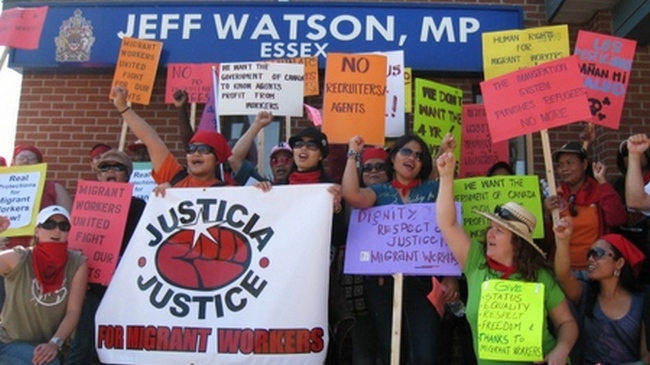
|
September 27, 2011 - No. 2 40th Ontario General Election What It Means to Think and Act in a New Way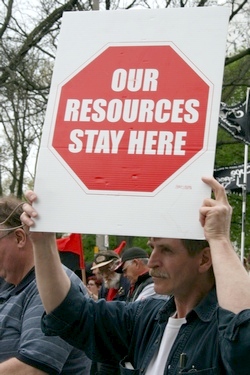   • What It
Means
to Think and Act in a New Way -
Jane Steeple 40th Ontario General Election What It Means to Think and Act in a New WayTo think and act in a modern way is natural for a modern social force such as the working class. To be modern means to solve problems and search for alternatives that move society forward and not block the march of humanity towards the new. The distinguishing feature of the working class is its social nature. Workers live and work in a social way more than any other class in history. They work and produce collectively in a social atmosphere of one for all and all for one. To be true to its modern character, the working class puts the human factor/social consciousness at the centre of its thinking and actions. Working class outlook and politics are human-centred. To think in a retrogressive way is characteristic of an obsolescent social force that does not want humanity to progress. Owners of capital are an obsolescent social force. Their private ownership and control of parts of the socialized economy exist in contradiction with the socialized forces of production and their operation in harmony with each other and with the social and natural environment. Recurring economic crises, unemployment, wrecking of manufacturing, denial of rights, irrational development and despoiling of the natural environment are aspects of this unresolved contradiction. The contradiction of owners of capital with the socialized economy leads them to retrogression in all aspects of life of which the most decisive is politics. Retrogressive politics puts the egocentric narrow interests of the owners of capital at the centre of their thinking, outlook and actions as they block the working class from solving problems in the socialized economy and moving society forward, and block the natural human-centred outlook of the working class from developing. The outlook of owners of capital and their politics are capital-centred. The main political contradiction in Ontario is between the human-centred politics of the working class and the capital-centred politics of the owners of capital. This contradiction is one-sided at present because the voice of the working class and its modern human-centred politics are missing. The most important task confronting the people of Ontario is to build the material conditions for the human-centred voice and politics of the working class to resonate throughout the province and become a force for change. The working class voice and politics cannot be heard or become effective without consistent opposition to the capital-centred outlook and thinking of the owners of capital. The working class must nurture as its most important mission its own organizations, thinking, modern outlook and social consciousness. To organize workers and allow their own thinking, modern outlook and social consciousness to flourish are no small matters for they are blocked by the prevailing capital-centred anti-social consciousness of the owners of capital and their politics and mass media. Ontario Political Forum is determined to break the silence on working class conditions, politics, thinking and human-centred social consciousness and break through the block on their development.
Election Issues Leaders' Debate Highlights Lack of
|
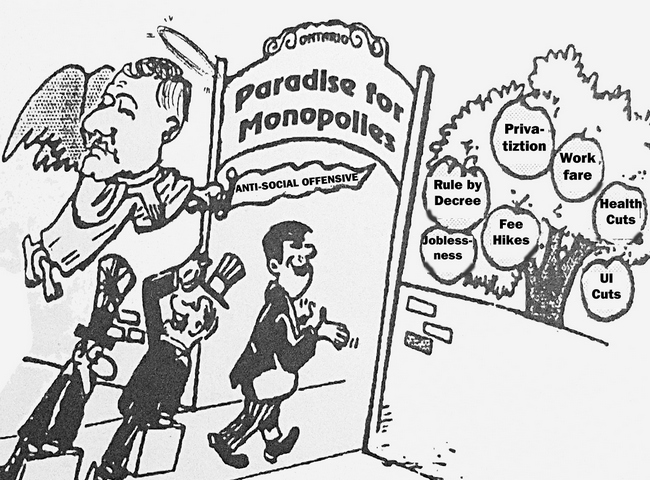 Which party will change the direction of the economy and end the anti-social offensive? |
The media and establishment forces justify this exclusion on the basis that the purpose of holding "free and fair" elections is to gauge a clear and coherent expression of the political will in the form of a party government. Thus, parties and candidates they deem have no chance of forming a party government are dismissed by them out of hand and the establishment media consider their responsibility to inform on only a select few parties. The same forces also decide which issues are important and how the questions about them should be posed in the debate -- -- "Tax hikes or public services?" They report on other parties and candidates in a sideline way, making sure they report in a manner that decontextualizes the issues. All of this serves to create the illusion that the programs and platforms of the so-called the major parties are aimed at solving problems the people face. This is simply not true. The programs of successive governments of Ontario, whether NDP, Liberal or Conservatives, have all been set by the monopolies, not the working people.
Excluding and limiting serious political debate under the guise that this process will determine which party deserves the people's trust on election day is a leftover from the days when political parties and the party system they formed represented a kind of nation-building project. This is no longer the case.
In the 1970s, the national project which in the post-war period took the form of a social welfare state went into crisis and has since been dismantled under the guise that it interferes with the program of opening Ontario for Business, which was supposed to guarantee prosperity. Prosperity for whom? The loss of manufacturing jobs and the end of the post-war arrangements, including lower rates of unionization, two-tier and stagnating wages, deteriorating working conditions and safety standards, the loss of pensions and benefits, decent public health care and education programs and a certain sense of stability and prosperity for the people, were the result when Mike Harris "opened Ontario for Business." Even before Mike Harris, the Liberal mole Bob Rae started implementing programs to make the people pay for the crisis in the name of social solidarity.
Will any of the leaders rise to the occasion and make the issue in this election to change Ontario's direction so as to block monopoly right? Or will the workers be called on to split their vote so that a party over which they exercise no control wins the election? How will what is called the Leaders' Debate help them make up their mind which party to vote for? What will be the criteria for making the decision?
Ontario Political Forum does not think the debate will help the workers make this choice. Only deliberation amongst their own peers will assist them to put their own agenda on the table and work out what can be done to advance that agenda. Why would they chose between agendas set by others?
Ontario's working people will have to think very seriously how to unite their ranks behind their own interests so as to create the conditions to not only hold the political parties to account but establish a process which enables them to have their own representation as well.
When bombarded by talk about "The Leaders' Debate," the workers and people of Ontario have to keep in mind not to hand over to others their right to decide all the important matters which affect their lives.
Warnings that they had better "go out and vote for the right leader" or else they will have only themselves to blame for their plight are diversionary. The situation requires that either the political parties take up a new direction for Ontario and deal with the serious problems we face such as the loss of manufacturing, plunder of natural resources, decreasing standard of living and loss of sovereignty, or these problems will become increasingly difficult and dangerous.
The Right of Injured Workers to Health, Safety and Workers' Compensation

Injured workers and supporters occupy office of Progressive Conservative Leader Tim Hudak, August 17, 2011.
TML: Injured workers held a Day of Action on August 17 where you occupied six riding offices of MPPs, including Premier Dalton McGuinty and Leader of the Progressive Conservatives Tim Hudak. What was the purpose of these actions?
Karl Crevar: The Day of Action was organized by the Ontario Federation of Labour and the Ontario Network of Injured Workers Groups. The purpose was to draw attention to and ensure that the politicians have compensation and health and safety issues on the election agenda. We want to make it an election issue.
TML: In your action, you raised a particular concern over Progressive Conservative leader Tim Hudak.
KC: Hudak comes from the Harris government. He voted for the implementation of Bill 99 [Workers' Compensation Reform Act, 1996 -- TML Ed. Note] which cut cost of living for the injured workers. The Harris government scrapped cost of living, scrapped the Royal Commission that was examining the Workers' Compensation system. Bill 99 was central to changing the system from the Workers' Compensation system to the Workers Safety and Insurance Board (WSIB). The result was that workers lost their cost of living increases, they lost their purchasing power and were driven further into poverty.
In the recent period, Hudak pushed forward the idea of giving breaks to employers in the premiums they pay into the health care system and into the workers' compensation system which is entirely financed by employers' premiums. That is exactly what they did with Bill 99. They reduced the premiums paid by the employers to where they were as far back as 1985. This created what is now being called the financial crisis at the Board, which is being used to attack injured workers. Hudak is not very specific in what exactly he is going to implement if elected but we suspect that he is going to reduce the employers' premiums even further. He is going to do what he did under the Harris government and go even further. When we were occupying his office, we did not receive a direct response from Hudak but he sent an email to the media blaming McGuinty for everything and asked people to vote for him. As far as McGuinty is concerned, we have not heard anything from him at all.
TML: What are the main demands that the injured workers are putting forward in this election?
KC: First, we are demanding that the three parties stop playing political football with injured workers' lives. We are asking that the three parties work together to restore a fair system of compensation. All parties must do that, whether they get elected or not, and end at once the poverty of the injured workers. We are also saying that we are no longer coming cap in hand.
We are demanding the immediate and retroactive reinstatement of cost of living. The NDP government of Bob Rae reduced cost of living for the injured workers with the Friedland Formula in 1994 and when the Conservative government got in it reduced it even further, virtually eliminating it.
 We want deeming eliminated
once and for all. Deeming is
used to reduce the loss of earnings on which the benefits of the
injured workers are based. It assumes that injured workers have found a
job, even if it is not the case, and therefore their loss of earnings
in relationship to what they were making when they
got injured is estimated at much less than what it really is and
benefits are reduced accordingly.
We want deeming eliminated
once and for all. Deeming is
used to reduce the loss of earnings on which the benefits of the
injured workers are based. It assumes that injured workers have found a
job, even if it is not the case, and therefore their loss of earnings
in relationship to what they were making when they
got injured is estimated at much less than what it really is and
benefits are reduced accordingly.
We are also demanding that experience rating be eliminated. Experience rating rewards employers with rebates based on reduction of reported injuries. It creates a scenario where employers will hide claims.
We are also demanding restoration of life-time pensions. The current system is based on loss of earnings and this is calculated only up to the point where injured workers turn 65 years old. All calculations of loss of earnings cease at 65 years of age when old age security benefits kick in. The elimination of pensions for life was a huge loss for injured workers.
TML: The WSIB is in the midst of a funding review of its activities. It is all being done under the hoax of eliminating the so-called unfunded liability of the compensation system. What is your view on that?
KC: We challenge the outlook that the problem is an unfunded liability in the system. By unfunded liability, what is meant is that there should be enough money in the system at all times to pay for future claims costs. That is being called full funding of the system. When I spoke to the Chair of the WSIB, I told him that if they had not reduced the employers' premiums like they did, the Board would not even talk about a financial crisis now.
So what are they up to? Their recurrent theme is that the problem is in the length of time the benefits last and in their high cost to the system.
And they do not feel that they have to wait for the recommendations of the funding review to take action. The Board posted "savings" of $500 million in its financial report of 2010. Where do you think they have found these $500 million?
The Board is already acting on the basis of new directives. For example, previously, when an injured worker had received benefits for 72 months the Board had to make a decision to lock them in or not, which meant that if you were locked in, your benefits were guaranteed until you are 65. Now they are saying that unless you are totally disabled, 100 per cent disabled, you are able to work. They are using deeming for those people who are at the point of having their benefits locked in so that they can reduce their loss of earnings (as if they had a job) and cut them off. They are already changing the way they are managing claims. That is a major contributor to injured workers' poverty.
What it does also is to force taxpayers to subsidize the compensation system more and more. The system is supposed to be financed solely by employers' premiums. Not a penny of the taxpayers’ is collected by the WSIB. But the taxpayers are actually subsidizing it through social assistance, the Ontario Disability Support Program and other social programs. If an injured worker wins his claim, his health care costs are covered by the Board. If he loses and puts up a challenge, he has to rely on social programs that taxpayers fund. Often even if they receive compensation, the amount they get falls so much short of what they need to live that they have to use social programs.
Meanwhile, there is intense lobbying by the employers' organizations to reduce their premiums.
Our message is that people should take an active role when it comes time to vote, demand of whomever is running and from whichever Party that health and safety and compensation are on the election agenda.
Hudak Retreat on Full-Day Kindergarten
As the Ontario election opened, the Ontario Progressive Conservative Party had to retreat from its previously stated position of scrapping Ontario's program of full-day kindergarten for four- and five-year olds (FDK). Premier Dalton McGuinty's Liberal government has been bringing in FDK slowly across the province since 2009. PC leader Tim Hudak earlier this year called the program a frill that Ontario cannot afford because of the need for "deficit reduction." He pledged to eliminate the program if elected.
Eliminating FDK was to be one element in the PC's neoliberal agenda for paying the rich, driving down the living and working conditions of the working class and starving social programs. Hudak had seen in FDK a "wedge issue" that could be used to inflame voters against each other. "Why should you taxpayers pay for raising other people's children?" Hudak would ask voters. He hoped to use this as one of the issues for disuniting opposition as his party pushes forward the pay-the-rich anti-social, anti-people offensive the way Harper and Toronto Mayor Rob Ford have done in recent elections.
But the PC Party has been forced to remove killing the FDK program from its platform. Hudak now claims that he is "committed" to completing the plan for implementing FDK across the province by the 2014-15 school year. This retreat on FDK reveals possibilities for resisting the all out assault on social programs by the rich and their political servants like Hudak, Harper and Rob Ford.
The PCs retreated when polling revealed how widespread the support for this program is among voters. Part of the support for the program comes from working class families crushed under the burden of user-fees in Ontario's child care/early learning system. As well, low-income families are totally excluded from the system and see FDK as a glimmer of hope. Even families that can manage the high fees are fed up with the chaotic child care system and see FDK as the seeds of a stable, professional system run by the public school system.
The popularity of the program among directly affected families though was not the only factor in the PC retreat on the FDK program. Even among voters who do not have young children there is widespread conviction that government should provide child care and early learning as essential social services necessary in a modern society.
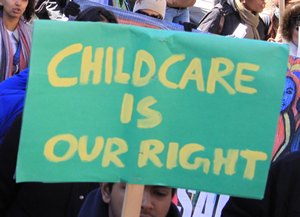 This conviction has been
developed through conscious
organizing to create pro-social public opinion. The workers' movement
has played a central role in this. It has taken up access to child care
and early learning for all as part of the defence of the fundamental
rights of women and children. Trade unions have
committed concrete resources to organizing. Trade union women's
committees, other women's organizations, working people in community
organizations and organizations of pedagogical academics have united
around a program of quality universal child care/early learning as a
necessary public service. They work
tirelessly creating public opinion for this program.
This conviction has been
developed through conscious
organizing to create pro-social public opinion. The workers' movement
has played a central role in this. It has taken up access to child care
and early learning for all as part of the defence of the fundamental
rights of women and children. Trade unions have
committed concrete resources to organizing. Trade union women's
committees, other women's organizations, working people in community
organizations and organizations of pedagogical academics have united
around a program of quality universal child care/early learning as a
necessary public service. They work
tirelessly creating public opinion for this program.
Hudak not being able to use FDK as a wedge issue and having to back off may seem like a small victory considering the scale of the assault underway on social programs, especially when the inadequacies of McGuinty's FDK program are taken into account. But it is important. It shows that resistance to the anti-social offensive is possible. And it shows the way to resist -- conscious political organizing by the working class to defend the rights of all.
McGuinty and the media allied with him will surely try to exploit the popularity of FDK during the election by promoting this issue widely. This will open up space to hold McGuinty to account for trying to bring FDK in on the cheap, as well as for the underfunding and chaos of the entire fee-based child care/early learning system. It will also present an opportunity to press Hudak and the PC agenda of social program cuts as he backpedals on child care/early learning.
For Your Information
Voting in the Ontario Election
The "Who Can Vote" section of the Election Ontario website www.wemakevotingeasy.ca provides the following information on voting in the October 6, 2011 elections:
Who Can Vote
On election day, you can vote if you:
-
Are
18
years
of
age
or older,
-
Are
a
Canadian
citizen,
-
Reside
in
an
electoral district, and
-
Have
not
already
voted in this election
What Happens If You:
- Live temporarily outside the province
If you are temporarily living outside of Ontario, you can apply to vote by Special ballot (* see below) and also apply to be named on the Register of Absentee Electors, subject to certain conditions.
If you are an elector temporarily living outside Ontario for a period of less than 2 years, you are eligible to vote by mail if you are 18 years of age or older on election day, a Canadian citizen, have not already voted in this election and
-
You
stopped
living
in
Ontario
in the two years before election day
-
You
lived
in
Ontario for a minimum of 12 consecutive months before
leaving the province and
-
You
plan
to
live in Ontario again
Note: Qualified electors in the following categories can vote regardless of the length of time they have been out of Ontario. These electors are:
-
On
active
duty
as
a
member
of the Canadian Forces
-
Working
for
the
Government of Canada or Ontario
-
Attending
an
educational
institution, or
-
A
family
member
of anyone in the above list
Live Inside the Province but Are Temporarily Outside of Your Electoral District
If you are an eligible elector living somewhere in Ontario, away from your permanent residence, you can return home to vote at an advance poll or on election day, or vote in your returning office by Special Ballot.
If you are unable to vote at an advance poll or on election day or at your returning office, you can apply to vote by Special ballot.
Are in a Correctional Facility
As an incarcerated elector, you can apply to vote by Special ballot using the vote by mail process.
Live On or Off Campus as a Post Secondary Student
During an election, you may find yourself living away from your family's home. You may wish to vote for a candidate in the electoral district where you live while attending college or university or you may want to vote for a candidate in the electoral district where you live while not attending school.
You are given the opportunity to decide which residence you consider to be your principal residence. Regardless of which residential address you choose, all voting options, including voting by special ballot, are available to you.
If you are a student with a physical disability and cannot go to the returning office, advance poll or election day to vote, you may request a home visit.
Are Temporarily in Hospital
Electors who are temporarily hospitalized and unable to vote at advance polls, on election day, or at the returning office may vote by Special Ballot. To accommodate these electors, Special Ballot Officers will go to each hospital to facilitate the completion of the Special Ballot Application and voting processes.
Hospitalized electors will be able to vote regardless of whether the hospital is inside or outside of the electors' electoral district at the time the election is held.
The visit will be administered on September 26, 27, 28, 2011 from 9:00 am to 5:00 pm local time each day.
Are Unable to Leave Your Home
An elector may make a request for a home visit to their local Returning Officer if:
-
It
is
impossible
or
unreasonably
difficult
for the elector to go to the
returning office, and
-
The
elector
requires
assistance with making an application to vote by
Special Ballot because of a disability or because of the inability to
read or write.
Have no Permanent Residence
The place where you most frequently eat or sleep during the five weeks prior to election day is considered your residence. Check our ID page to see if you already have a piece of ID that meets our requirements.
If you don't have ID showing proof of your name and residence, Elections Ontario has created a temporary form of identification -- the Certificate of Identity and Residence -- to meet the requirements to receive a ballot. The Certificate of Identity and Residence shows either a shelter, food bank or community health facility -- a place where the elector returns to either eat or sleep in the 5 weeks preceding election -- as the prospective voter's residence. If you eat or sleep at a shelter, food bank or community health facility, you can ask a staff member from that facility to help you fill out this form. You may also contact Elections Ontario for help.
Staff members of homeless shelters, food banks or community health facilities who would like to help their clients receive this temporary ID form are encouraged to contact Elections Ontario, or download the instructions and registration form.
When can I request a home visit at my returning office or satellite office?
You can call your returning office or satellite office starting on September 7, 2011.
*Voting by Special Ballot is a process that provides electors with an opportunity to cast their ballot either in-person at their local returning office or to vote by mail.
Additions to the List of Electors
Qualified electors whose names are not on the List of Electors may be added to the list by making a statutory declaration and providing proof of identity and proof of residence before 8 pm on Wednesday, October 5, 2011 at their electoral district's Returning Office or during voting hours at an Advance Poll in their electoral district or during voting hours at their voting location on Election Day. To access information on Returning Officers, click here.
Advance Polls
Will be held at locations chosen for ease of access from Wednesday, September 21, 2011 to Friday, September 30, 2011 from 10 am until 8 pm.
Election
Day
Thursday,
October
6,
2011
Voting
hours
are
from
9
am
-
9 pm ET
Calendar of Events
Pilgrimage to Freedom: Join the Caravan
in Support of
Migrant Workers
|
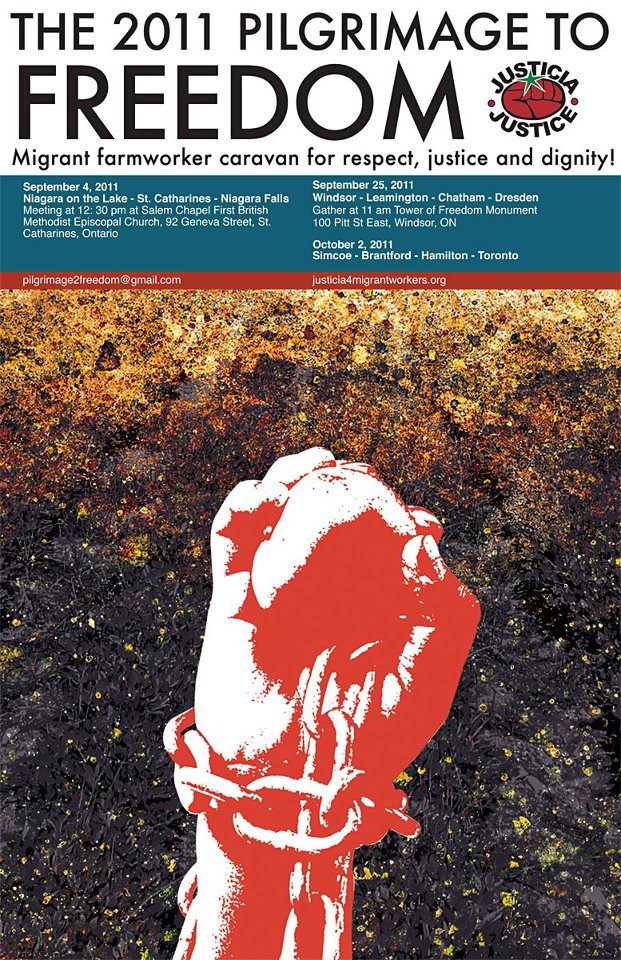 On Sunday, October 2 in
Simcoe, migrant workers and their allies will hold the third leg of a
Caravan to demand
justice, respect and dignity for workers employed under the auspices of
Canada's Temporary Foreign Worker Program. The first leg was held in
the Niagara region on September 4 and the second on September 25 in
Windsor. The Caravan follows
last year's historic Pilgrimage
to Freedom, in which over 150 migrant workers and their allies marched
over 50 kms, an equivalent of 12 hours, from Leamington to Windsor,
Ontario.
On Sunday, October 2 in
Simcoe, migrant workers and their allies will hold the third leg of a
Caravan to demand
justice, respect and dignity for workers employed under the auspices of
Canada's Temporary Foreign Worker Program. The first leg was held in
the Niagara region on September 4 and the second on September 25 in
Windsor. The Caravan follows
last year's historic Pilgrimage
to Freedom, in which over 150 migrant workers and their allies marched
over 50 kms, an equivalent of 12 hours, from Leamington to Windsor,
Ontario.
This year, the Pilgrimage continues in the form of
caravan across rural Ontario. Migrant workers and their allies will be
recreating the stops of the underground railroad to pay tribute to the
important struggles of resistance that this struggle is based on.
Justicia for Migrant Workers (JM4W)
is requesting the support of community, religious,
labour and allied organizations to join this year's two remaining
actions.
J4MW, which is organizing this year's Caravan, points out: "Over the last year, thousands of people have heard the testimonies and the stories that led to organizing the march. Demands for permanent residency and citizenship status, an end to repatriations and deportations, labour law reform, equal access to social entitlements and an end to the coercive role of recruiters and contractors has inspired many others about the realities faced by migrant workers in Canada."
For more information on the Caravan contact J4MW at: pilgrimage2freedom@gmail.com
Public Meetings:
Canada's Communities Are Not for Sale!
|
Important
discussion
on
the
proposed
Canada-Europe
Free
Trade
Agreement
which will jeopardize municipal services and
independence

On Tuesday, September 27 the Council of Canadians and the Canadian Union of Public Employees are holding a public meeting in Hamilton under the theme "Canada's Communities are Not For Sale." Canadian Union of Public Employees (CUPE) President Paul Moist and Council of Canadians National Chairperson Maude Barlow will speak and will be joined by USW Local 1005 President Rolf Gerstenberger. A similar event is planned for Windsor on Wednesday, September 28.
These meetings are part of a country-wide tour organized by CUPE and the Council of Canadians to raise awareness of this trade deal with Europe and to point out the detrimental effects for Canada.
Several rounds of CETA negotiations have been held since last year; the next is scheduled for Ottawa at the end of October. The website of the Department of Foreign Affairs and International Trade reports on the present state of negotiations:
"Canada and the European Union (EU) have completed the eighth round of negotiations toward a Comprehensive Economic and Trade Agreement. Significant progress continues to be made in key areas, including goods, services, investment, government procurement and many others. The negotiating text is now well-advanced, with a number of chapters closed or parked pending further development, and issues in the remaining chapters narrowed down to key differences where solutions are now being actively explored.
"The parties are committed to resisting protectionist pressures in challenging economic times, and are seeking to achieve an ambitious outcome across all negotiating areas. The Government of Canada has made the CETA negotiations a priority in its international trade agenda and negotiators continue to move the negotiations forward as quickly as possible.
"Both Canada and the EU are committed to maintaining the momentum of the negotiations thus far with the aim of concluding by 2012."
Canadians are already familiar with the North American Free Trade Agreement (NAFTA) brought in by the Mulroney Conservatives, and the nation-wrecking it continues to cause by making Canada's needs and economy subservient to those of the rapacious U.S. empire and its monopolies. CETA will bring more of the same, but it goes further, exposing municipalities and their delivery of public services to "competition" with European monopolies. It is unacceptable that the affairs of Canada's municipalities be permitted to be privatized and put at the disposal of the monopolies, native or foreign. Canadians have already seen with their own eyes what happens when their public services are privatized. In Toronto, the Mayor is now trying to privatize public services and assets through deals which have been exposed as being for personal gain. For the government of Canada to be doing this as well, using the prerogative of the Prime Minister to negotiate treaties with foreign countries that grossly interfere in provincial and municipal affairs is a very serious matter. Canadians need to be aware of what the government of Canada is up to because it is their birthright which is being systematically whittled away.
The Council of Canadians points out on its website:
"Procurement, or the money our municipalities, school boards, provincial Crown corporations and utilities spend on public contracts, is the EU's first priority in the CETA talks with Canada. If concluded, a deal would ban these public bodies from favouring local or small-business bidders even when the tendering process was completely transparent and fair. The procurement chapter in CETA would remove one of the last remaining tools our local communities have to foster sustainable, local development.
"Services and investment commitments could include promises to liberalize (i.e. encourage more privatization of) drinking water or sanitation services, or to chip away at the relatively weak protections in NAFTA for public health care. They could make it impossible to put local investment conditions on major foreign takeovers such as local production targets in U.S. Steel's takeover of Stelco. The provincial offers we are not allowed to see could also remove foreign ownership caps on so-called strategic industries such as fishing and finance."
The Canadian Centre for Policy Alternatives makes a similar point, adding:
"The exclusion of local purchasing and services from the procurement restrictions of trade treaties [...] has also reduced the risk of litigation and demands for compensation from foreign investors and service providers when privatisation schemes are halted or reversed."
It is important to participate in these meetings, to become informed of the implications of the Canada-EU free trade agreement and join in actions to oppose the government's further sell-out of Canada.
Public Right, Yes! Monopoly Right, No!
Trade for Mutual Benefit, Yes, Not Nation-Wrecking Neoliberal "Free
Trade"!
Read Ontario Political Forum
Website: www.cpcml.ca
Email: ontario@cpcml.ca

